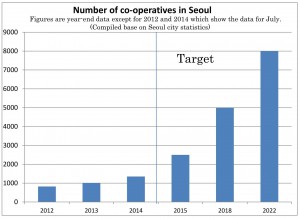Zhezhu Jin
The number of co-operative associations is rapidly increasing in Seoul, totaling 1,350 as of July 30, up 60 percent in two years.
The rise is attributable to efforts by the Seoul municipal government to encourage establishment of co-operatives under the vision of “Seoul, the City of Co-operative” declared in July 2012. The vision was set up to cope with social issues that emerged with the rapid economic growth, including widening disparity of wealth, increase in unemployment and social unrest caused by dismantling of communities.
The city said co-operatives can play a role in solving such problems, as citizens are increasingly concerned that the government’s neoliberalistic economic policies, which are conducted after South Korea signed a free trade agreement with the United States, are pressuring firms to step up competition.
45 co-operatives were created in Seoul in July only, supporting such activities as veranda farming and laundry service for the elderly.
For instance, a co-operative for people growing vegetables in their gardens and apartment berandas, their supervisors and those who sell their products is aimed not only at increasing members’ income but also at confirming the safety of elderly people living alone by encouraging them to become members.
Another co-operative created by people who are out of work offers laundry service for people who have difficulty doing it themselves.
The co-operatives, 98 percent of which consist of 50 or less members, are supported by the Seoul municipal government’s seven-member team, which conducts marketing surveys for the services offered by the co-operatives and provides management knowhow. No financial assistance is given.
Through supporting co-operative activities, the municipal government aims to support venture businesses, cultural activities and mutual support among residents so that people can trust one another and share the joy of living in the community, according to the declaration.
 The municipal government also set a numerical target of increasing the number of co-operatives in the city from 823 as of July 2012 to 8,000 in 2022, and let all adult citizens join at least one co-operative.
The municipal government also set a numerical target of increasing the number of co-operatives in the city from 823 as of July 2012 to 8,000 in 2022, and let all adult citizens join at least one co-operative.
“We hope to reduce the gap (between the rich and the poor) by shifting from policies focused on capital to those focused on people,” says Sul-Hee Kim, head of the municipal government’s support team. “By strengthening cooperativeness rather than competitiveness, we want to put a break on the increase in nonregular employment and create stable and sustainable employment.”
In 2012, the South Korean government introduced a comprehensive law on co-operatives in addition to the laws for agricultural co-operatives and consumers’ co-operatives. Under the law, co-operatives can be established if at least five members hold an inaugural meeting and receive approval from local authorities. Although no tax incentives are given, co-operatives are gaining popularity among people as they are democratically operated under a one person, one vote system.
In Seoul, efforts to encourage setting up of co-operatives are led by Mayor Won-Soon Park, a lawyer who won the mayoral election four years ago by pledging to shift the policy focus from economy to people and introduce such measures as free school lunches. Park, who was re-elected this year, has been criticizing the South Korea-U.S. FTA, after looking into more than 700 ordinances in Seoul and finding out that 30 of them may be incompatible with the FTA.
The South Korean government, which has been putting emphasis on economic growth, promoted the FTA and managed to improve the overall income levels of its people. But according to the National Statistical Office of Korea, the average monthly income of non-employed people, such as farmers and nonregular workers, in households with two or more members was JPY350,000 in the first quarter of this year, which is equivalent to 71 percent of that of employed people, down 8 percentage points compared with 2013, indicating widening gap between the rich and the poor.
(July 31, 2014)

